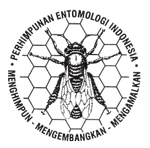Gejala serangan dan tingkat serangan Sparganobasis subcruciata Marshall sebagai hama baru pada kelapa sawit di Indonesia bagian timur
DOI:
https://doi.org/10.5994/jei.16.1.41Keywords:
Dryophthorinae, oil palm, stem borerAbstract
Sparganobasis subcruciata Marshall is a species of weevil occurring in Papua and eastern parts of Indonesia, which had been begun found to causes damage to oil palm in the Boven Digoel district. The research was carried out to investigate the symptoms of S. subcruciata attack and it's damage level in one of oil palm plantation in Boven Digoel. The result shows that larvae of this weevil bore into the stem, particularly the lower part, giving rise to symptoms which are similar to symptoms of Ganoderma disease, specifically the occurrence of more than three leaves in the spear failing to open, hanging down and drying out and the ultimate death of the palm. The weevil has been detected in Boven Digoel, Papua, where significant numbers of oil palms appeared to be dead or dying in each of the plantation visited by us. We consider that this weevil constitutes a major threat to oil palm plantations in Papua and that it may in the future, if it is not already the case, be a threat to plantations in Eastern Indonesia. Early detection of the presence of the weevil is difficult and requires research, as do methods of control, which we suggest should focus on the development and use of pheromones.
Downloads
Downloads
Published
How to Cite
Issue
Section
License
Authors who publish with this journal agree to the following terms:
- Authors retain copyright and grant the journal right of first publication with the work simultaneously licensed under a Creative Commons Attribution 4.0 International License that allows others to share the work with an acknowledgement of the work's authorship and initial publication in this journal.
- Authors are able to enter into separate, additional contractual arrangements for the non-exclusive distribution of the journal's published version of the work (e.g., post it to an institutional repository or publish it in a book), with an acknowledgement of its initial publication in this journal.
- Authors are permitted and encouraged to post their work online (e.g., in institutional repositories or on their website) prior to and during the submission process, as it can lead to productive exchanges, as well as earlier and greater citation of published work (See The Effect of Open Access).








